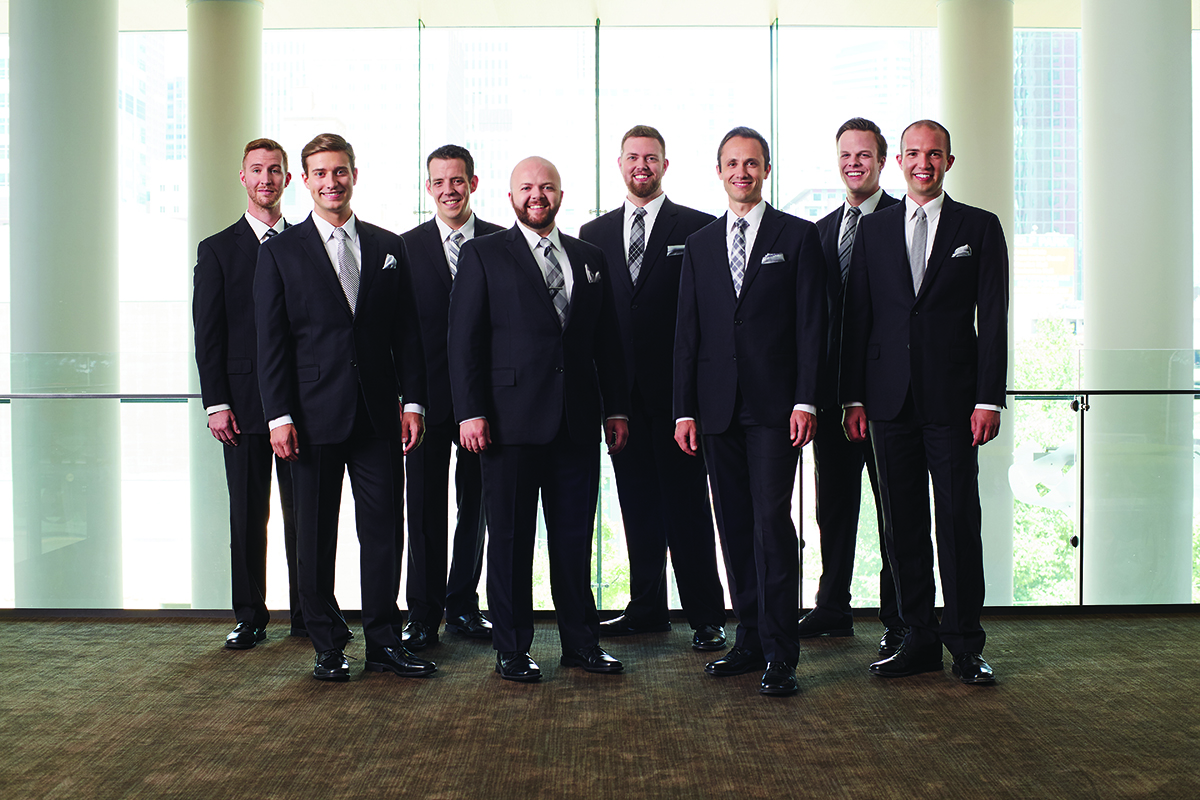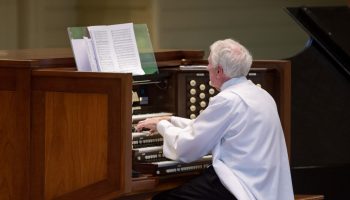Cantus is a choir with a conscience.
More so than similar groups, like Chanticleer or The King’s Singers, the group uses its touring concerts as a platform to address social issues.
At 4 p.m. Monday in Elizabeth S. Lenna Hall, the Minnesota-based men’s chorus will present a concert titled “No Greater Love Than This.” The program loosely follows a soldier’s journey from the excitement of going to war to the realization of war’s horrors.
“It’s not exactly a story, but there’s definitely a narrative,” said baritone David Geist.
The idea for the program came from a musical setting of the Latin Requiem Mass by former Cantus member Timothy Takach. The Latin text quotes a passage from the Book of John: “Greater love hath no man than this: that a man lay down his life for his friends.”
When the singers were deciding on the program three years ago, they thought soldiers’ experiences formed a large part of American culture and identity.
“We wanted to share a multitude of different perspectives from the soldiers’ experiences throughout war,” Geist said.
To represent the initial excitement of going to war, the program begins with propaganda songs from the early 20th century. Songs like George M. Cohan’s “Over There” and Isham Jones’ jaunty “We’re In the Army Now” were designed to persuade young men to either enlist, or, when they had no choice, embrace the war with full-throated enthusiasm.
“And then we have songs where people realize how serious war is,” Geist said.
The subject of death in war surfaces early in the program with Richard Peaslee’s setting of the Alfred E. Houseman poem, “When I Would Muse in Boyhood.”
Cantus is sometimes criticized for framing its concerts with overt messages about divisive issues. A Minnesota critic earlier this year accused the group of “preachiness” at one of its Twin Cities appearances. Cantus had partnered with the local YWCA to present music addressing LGBT rights, race and gender equality.
“They had a mission that fit in well. We recorded interviews with them and made them part of the program,” said tenor Paul Scholtz.
Vocal music, more so than symphonies or chamber works, can be used to communicate a clear message to the audience because it incorporates text.
“Our mission is to give voice to human experience,” Scholtz said. “We think it’s important to try to not just represent the voices we hear most often.”
However, one of the inherent problems with existing war-themed choral repertoire is its limited point of view.
“When you look at the library of music about war, it is often from the male perspective,” Geist said.
And when it comes to a heavy, difficult topic such as war, artists sometimes risk glamorizing it.
“That’s a fear we have as artists. Have we captured this well enough?” Scholtz said. “War is a terrible, terrible thing. By singing about it, are we saying it’s not so bad because of all this pretty music?”
Scholtz said the group tries its best to convey the full force of the experiences that inspired the music and the text, “knowing that, invariably, we’re going to fall short.”
Our mission is to give voice to human experience. We think it’s important to try to not just represent the voices we hear most often.” – tenor Paul Scholtz said.
To get as close as possible to first-hand depictions of war, Cantus chose several pieces set to the words of actual soldiers. None of the group’s eight members have been soldiers themselves.
“We’re telling other people’s stories,” Geist said.
The second half of the program accelerates the trajectory from exuberance to sorrow and, ultimately, aspiration. After a medley of Army-themed tunes, the mood immediately shifts with Lee Hoiby’s “Last Letter Home.” The text is a letter Pfc. Jesse Givens wrote to his family from Iraq in 2003.
“My Family,” the letter begins, “I searched all my life for a dream and I found it in you.”
Cantus was one of several choirs that jointly commissioned the work in 2009. Hoiby’s work has quickly become a mainstay of the choral repertoire.
“You look out after the last notes of the piece and you invariably hear some sniffing and see some teary eyes,” Scholtz said. “But it’s really a pleasure to perform it because anyone can relate to it. He’s talking about his children, he’s talking about his love for his spouse. You can put yourself in the position of the child or the father or the spouse, and it’s just heart-rending.”
To address the depression that some soldiers experience after leaving the battlefield, Cantus commissioned a new work called “Beneath Thin Blanket.” Composer Jeff Beal, who wrote the score for the Netflix series “House of Cards,” used poetry by Vietnam veteran and retired Maj. Gen. John Borling. The poems were written while Borling was a prisoner of war in Hanoi for more than six years.
The concert also explores the intersection of LGBT rights and military service. Australian-American composer Melissa Dunphy wrote a piece based on the testimony of WWII veteran Phillip Spooner before the Maine Senate about a proposed marriage equality bill. The piece uses verbatim quotes from that testimony to consider whether the fight to protect American freedom extends to all citizens.
At the climax of the piece, a senator asks Spooner, “Do you believe in equality for gay and lesbian people?”
Then, silence.
Finally, Spooner replies, “What do you think I fought for at Omaha beach?”
“It’s a really powerful moment,” Geist said. “But it’s also a very beautiful, moving moment.”





